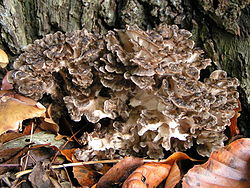I've had a swag of responses to my post on Dr Young and his insistence on excluding all mould from his alkaline diet. Some simply said they like Dr Young's diet and have had great results following it exactly, but most agreed that the 'mould' thing really didn't hold water.
One lady wrote to tell me that his diet made her so weak she had to give it up. Which only reiterates the fact that we are all individuals, and all need to find our own health path most suitable.
I was browsing latest anticancer news today and found an interesting report from the Memorial Sloan-Kettering Cancer Center (MSKCC). It compared the following seven botanical extracts and fractions:
(1) H-48 (a Chinese mixture of herbs)
(2) Coriolus vesicolor, or its derivatives: purified polysaccharide-K (PSK) or purified polysaccharide-peptide (PSP)
(3) Maitake mushroom extract
(4) Echinacea
(5) Astragalus root
(6) The yellow spice turmeric; and
(7) β-glucan derived from yeast.
All of these are popular supplements used by cancer patients. The MSKCC authors looked at the ability of these substances to induce immune reactions in laboratory mice.
The bottom line of the study was this:
Consistently significant activity was seen with four of the preparations:
(1) Coriolus mushroom extracts (especially PSK);
(2) Alcohol extract of astragalus;
(3) yeast β-glucan; and (to a lesser extent)
(4) Maitake mushrooms.
So three of the four best immune support supplements are in Dr Young's words, 'mould' or mould-derived. Take a look at bets-glucan on Wikipedia here.
Does that mean that Dr Young would advise against all of these proven anti-cancer supplements?
One lady wrote to tell me that his diet made her so weak she had to give it up. Which only reiterates the fact that we are all individuals, and all need to find our own health path most suitable.
I was browsing latest anticancer news today and found an interesting report from the Memorial Sloan-Kettering Cancer Center (MSKCC). It compared the following seven botanical extracts and fractions:
(1) H-48 (a Chinese mixture of herbs)
(2) Coriolus vesicolor, or its derivatives: purified polysaccharide-K (PSK) or purified polysaccharide-peptide (PSP)
(3) Maitake mushroom extract
(4) Echinacea
(5) Astragalus root
(6) The yellow spice turmeric; and
(7) β-glucan derived from yeast.
All of these are popular supplements used by cancer patients. The MSKCC authors looked at the ability of these substances to induce immune reactions in laboratory mice.
The bottom line of the study was this:
Consistently significant activity was seen with four of the preparations:
(1) Coriolus mushroom extracts (especially PSK);
(2) Alcohol extract of astragalus;
(3) yeast β-glucan; and (to a lesser extent)
(4) Maitake mushrooms.
So three of the four best immune support supplements are in Dr Young's words, 'mould' or mould-derived. Take a look at bets-glucan on Wikipedia here.
Does that mean that Dr Young would advise against all of these proven anti-cancer supplements?


No comments:
Post a Comment